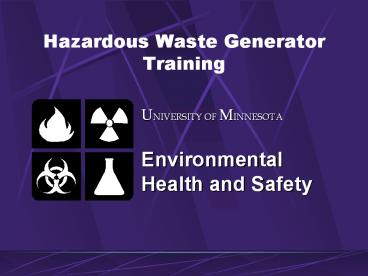Hazardous Waste Generator Training - PowerPoint PPT Presentation
1 / 29
Title: Hazardous Waste Generator Training
1
Hazardous Waste Generator Training
UNIVERSITY OF MINNESOTA Environmental Health
and Safety
2
Why Are We Here?
3
Tools For Compliance See the Rules of Thumb
- Hazardous Chemical Waste Guidebook
- Hazardous Waste Labels Forms
- Segregation/Containment Trays
- Emergency Information Posting
- Training Video and Documents
4
Responsibility
- You are responsible for proper management of
hazardous waste in your laboratory or service
area - Fines are responsibility of Departments receiving
them
5
Implications of Noncompliance for Academic
Institutions
- Fines in mid-1990s
- Stanford, Yale, Boston University
(350,000-1,2000,000) - Mankato State (65,000)
- New EPA Compliance Initiatives
- New England (Brown Univ. 0.5 M)
- West Coast (Univ of Hawaii 1.7 M)
- Very negative publicity
6
Past Deficiencies
- Hazardous waste in sewer
- Hazardous waste in trash
- Improper labeling
- Improper storage of hazardous waste
- Containers not closed
- Lack of secondary containment
- (Lack of weekly inspections)
- No documented training new employee/student
annual update
7
Do NOT Store Waste in Public Hallways!
- Not the bottles
- Not the boxes
- Why?
- Not safe for all involved
- Fire Code bans this
- No security
- Custodians may be confused and trash
8
Implications Cradle to Grave
- Researcher--the Cradle
- Waste Storage
- Waste Evaluation I
- EHS
- Maintain files, reports, licenses for 55
locations - Waste Evaluation II
- Transport waste to central storage
- Repackage and store at permitted facility
- Contract for, transport, track, and document
final disposal
9
Your Responsibility
- Proper disposal of wastes
- Dont evaporate, sewer or trash HW
- Use the U of M Chemical Waste Program
- Waste Evaluation
- Based on Generator Knowledge
- Detailed reporting of wastes
- Good labeling to avoid unknowns
10
Your Responsibility
- Waste Storage
- Labeling, proper containers, closed containers
- Emergency planning Containment, Phone lists
- Documented initial and annual refresher training
- Resources
- Guidebook
- http//www.dehs.umn.edu/guidebook/index.html
- Training video with training document
- EHS Monthly Training (3rd Thurs/Register 6-6002)
- HW Hotline 6-1604 hazwaste_at_tc.umn.edu
11
Thompson Center for Environmental Managment
12
Use Pollution Prevention
- Product Substitution--Biodegradable Scintillation
fluids - Process modification--Microscale Chemistry Labs
- Free Chemicals
- University Wide Initiatives
- 1998 Debunk the UCOs
- 1999 Mercury Reduction Initiative
- 2000 Electronics Collection
13
Chemical Redistribution
14
Mercury Reduction Initiative
- Thermometer Exchange
- Improved Amalgam Traps
- Manometers Dismantled
- New Steam Plant Cleaner Fuels
15
Recycle Electronics at the U
16
Electronics Waste
- University Computer Services (612) 624-4800
- will pick up your computer products free of
charge - good quality units resold http//www1.umn.edu/ucs
- others go for recycling
- University Recycling Program (612) 625-8084
- will also arrange to collect all electronic waste
including scientific equipment free of charge - Coming Soon Reuse Program/Virtual Warehouse at
http//www1.umn.edu/recycle/reuse.html - those not suitable for use are sent to the Us
electronics recycling contractor
17
Fire in Fumehood
18
More typical spill
19
Emergency Planning for Laboratories and Shops
- Practice Safe Science
- Designate an Emergency Coordinator
- Post emergency information by phones
- Know what to do in an emergency
20
Chemical Spill Procedures
- Call 9-1-1 from Campus phone Fire, explosion or
injury - Call EHS Beyond Your Capability to Handle
- Evacuate
- Call (612) 626-6002 during business hours
- Call 9-1-1 after hours
21
Response to Spills
- Evacuate
- Confine
- Report
- Secure
- Advise during clean-up
22
Questions
- Call the Chemical Waste Program at (612)
626-1604, or - e-mail at hazwaste_at_tc.umn.edu
- problems or need advice
- unlabeled chemicals
- shock sensitive chemicals
- sewering chemicals
- packaging requirements
- DDC or CAS numbers
23
Hennepin County Inspection 2001
24
Open Haz Waste Drum
25
Another Open Container
26
More Open HW Containers
27
Even More Open Untended Containers
28
Open Hg Waste Container
29
Who needs to stay for Bloodborne and Other
Pathogen Training?
- If you work with human blood
- If you work with other human body fluids spinal
fluid, synovial fluid, vaginal fluid, sperm - If you work with infectious agents viruses,
bacteria, fungi, rickettsia































